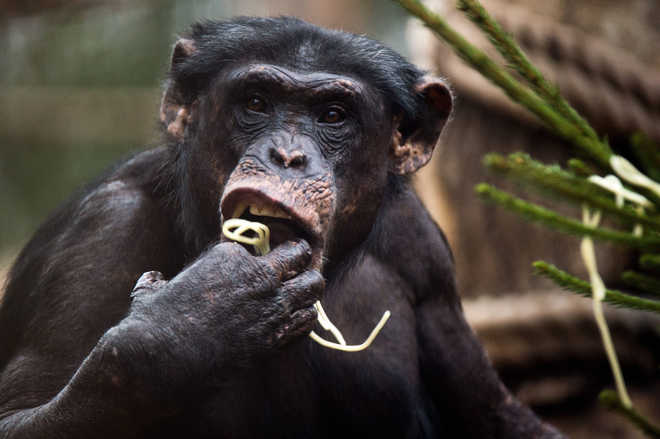
Photo for representational purpose only. DPA/PTI
BERLIN: Chimpanzees can sniff out strangers from family members by discriminating between the smell of group members and others.
Researchers, including those from Max Planck Institute for Evolutionary Anthropology in Germany, conducted one of the first studies investigating the signalling function of social odours in non-human great apes.
Published in the journal Proceedings of the Royal Society B, the study presented two groups of chimpanzees with urine from group members, strangers and an unscented control in aerated plexiglass boxes and videotaped their behaviour.
Chimpanzees sniffed longer at urine than at the control, suggesting they perceive the odour of other chimpanzees.
More importantly, they discriminated between the smell of group members and strangers, sniffing outgroup odours longer than ingroup odours.
“Chimpanzees are highly territorial, and encounters between groups are mostly hostile—in fact, they sometimes kill individuals from other communities—so olfactory cues might help them to locate other animals and determine whether they are group members or strangers, enhancing their survival and leading to fitness benefits,” said Stefanie Henkel of the University of Leipzig.
“Odour might be especially important because most chimpanzees live in dense forests where visibility is low, and because in chimpanzee societies, group members split up into subgroups that may not see each other for days,” Henkel said.
The researchers found that chimpanzees sniffed longer at the odour the more closely related they were to the odour donor, providing the first evidence for odour-mediated kin recognition in non-human great apes.
“The ability to recognise kin is crucial, because it allows animals to choose appropriate partners for coalitions, avoid mating with close relatives, and avoid killing their own offspring,” said Jo Setchell from Durham University in the UK.
“There is evidence that humans can also recognise the smell of their relatives, even as newborns. We apparently retained good olfactory capabilities, although we—like our closest relatives, the chimpanzees—don’t usually scent-mark, and lack the specialised olfactory system found in many other animals,” said Setchell.
“Our results help us to understand the evolution of primate chemical communication and suggest that we should pay more attention to olfaction in apes,” said Setchell. PTI



























